Today's fast-paced business environment, the need for skilled professionals who can navigate the complexities of Sales and Distribution (SD) within the SAP (Systems, Applications, and Products) framework is more pressing than ever. As an educator, I have witnessed firsthand the transformative impact that SAP SD courses can have on students. These courses not only provide technical knowledge but also equip aspiring professionals with the strategic mindset necessary to thrive in various roles across industries. This blog will delve into the importance of SAP SD training, the pedagogical approaches I adopt in teaching these courses, the key competencies students gain, and the long-term benefits of mastering this essential module.
The Significance of SAP SD Courses in Education
The business landscape is continually evolving, driven by technological advancements, changing consumer preferences, and competitive pressures. In this context, organizations need professionals who can effectively manage sales processes, streamline distribution logistics, and optimize customer relationships. SAP SD plays a pivotal role in enabling companies to achieve these objectives, making it a critical area of study for business students.
As an instructor, I emphasize the relevance of SAP SD in the broader spectrum of business operations. By integrating real-world examples and case studies into the curriculum, I help students grasp how SAP SD influences revenue generation and customer satisfaction. This knowledge not only prepares them for immediate employment but also fosters a deep understanding of how their roles can contribute to organizational success.
Innovative Teaching Methods for Engaging Learning Experiences
Teaching SAP SD courses requires a dynamic and engaging approach to ensure that students not only absorb information but also apply their learning effectively. Here are some innovative teaching methods I employ:
- Hands-On Experience with SAP Software: I believe in providing students with direct access to SAP software, allowing them to explore the functionalities of the SD module firsthand. This hands-on experience reinforces theoretical concepts and equips students with practical skills they can apply in real-world scenarios.
- Interactive Simulations: Utilizing simulation tools, I create realistic business scenarios where students can role-play as sales representatives, customer service agents, or logistics coordinators. This immersive learning experience fosters collaboration, problem-solving, and critical thinking.
- Group Projects and Presentations: Collaborative projects encourage students to work together, simulating a team environment they will encounter in their careers. These projects often involve analyzing case studies and presenting solutions, which enhances their communication and presentation skills.
- Guest Lectures and Industry Insights: Inviting industry professionals to share their experiences and insights provides students with valuable perspectives on the practical applications of SAP SD. This exposure helps them understand the skills and knowledge that are in demand in the job market.
Key Competencies Developed Through SAP SD Training
Students who engage in SAP SD courses develop a comprehensive skill set that prepares them for various roles in the business world. Here are some of the key competencies gained:
- Sales Order Management: Understanding the intricacies of the sales order process, from creation to fulfillment, empowers students to manage orders efficiently and ensure customer satisfaction.
- Pricing and Discount Management: Mastery of pricing procedures allows students to create competitive pricing strategies that align with market demands and maximize profitability.
- Customer Relationship Management (CRM): Knowledge of CRM principles within SAP enables students to manage customer data effectively, fostering long-term relationships and loyalty.
- Logistics and Distribution Knowledge: Students gain insights into inventory management and distribution logistics, ensuring timely delivery of products and optimizing supply chain operations.
- Analytical Skills: By analyzing sales data and generating reports, students develop critical analytical skills that enable them to make data-driven decisions.
The Long-Term Benefits of Enrolling in SAP SD Courses
The value of SAP SD courses extends beyond immediate job prospects; they offer a multitude of long-term benefits that can significantly impact students’ careers:
- Enhanced Employability: With businesses increasingly seeking professionals skilled in SAP SD, graduates with this expertise have a competitive edge in the job market. Their specialized knowledge makes them attractive candidates for various roles in sales, logistics, and customer service.
- Career Progression Opportunities: SAP SD proficiency opens doors to advancement within organizations. Graduates can transition from entry-level positions to roles such as Sales Manager, SAP Consultant, or Business Process Analyst, ultimately paving the way for leadership positions.
- Lifelong Learning Mindset: The field of SAP is ever-evolving, with continuous updates and new features being introduced. By encouraging a mindset of lifelong learning, I prepare students to stay current with industry trends and advancements, ensuring they remain relevant in their careers.
- Networking Opportunities: Through interactions with industry professionals and fellow students, graduates can build a robust professional network. These connections may lead to mentorship opportunities and potential job placements in the future.
Creating a Curriculum that Adapts to Industry Needs
To effectively prepare students for the workforce, it is essential to create a curriculum that aligns with current industry trends and demands. I continuously engage with industry stakeholders to ensure that my SAP SD courses reflect the skills and knowledge required by employers. This collaboration allows me to tailor course content, integrate relevant case studies, and provide students with the most up-to-date information.
Additionally, I encourage students to participate in workshops and training sessions outside the classroom, further enhancing their learning experience. This proactive approach not only enriches their understanding of SAP SD but also empowers them to take charge of their professional development.
Conclusion
As an educator, witnessing the transformation of students through SAP SD courses is one of the most rewarding aspects of my profession. These courses provide students with essential knowledge and skills, preparing them to become effective business leaders in a technology-driven world.
By focusing on practical applications, fostering critical thinking, and adapting to industry needs, I strive to equip students with the tools they need to succeed. The competencies gained from SAP SD training extend beyond the classroom, offering long-term career benefits that can significantly impact their professional journeys. As they embark on their careers, I am confident that the skills and knowledge acquired from these courses will serve them well, enabling them to navigate the complexities of the business world and contribute meaningfully to their organizations.
In a landscape where adaptability and specialized knowledge are paramount, SAP SD courses stand out as a vital stepping stone for aspiring professionals. Embracing this learning opportunity will not only enrich their understanding of sales and distribution processes but also set the foundation for a successful and fulfilling career in the ever-evolving business environment.









